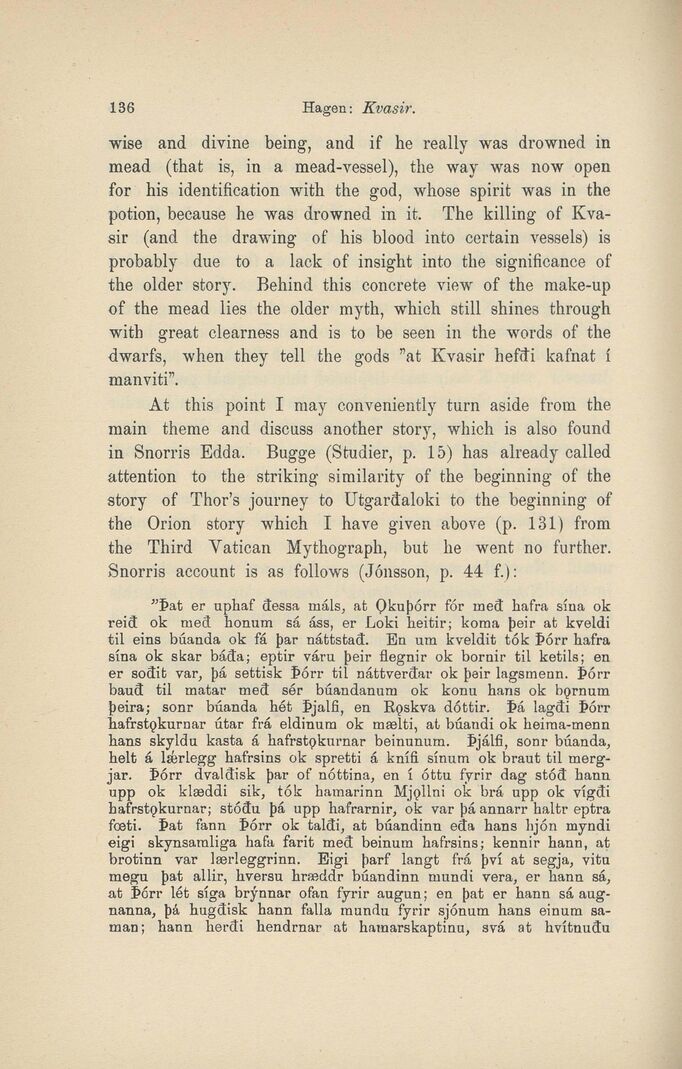
Full resolution (JPEG) - On this page / på denna sida - Sidor ...

<< prev. page << föreg. sida << >> nästa sida >> next page >>
Below is the raw OCR text
from the above scanned image.
Do you see an error? Proofread the page now!
Här nedan syns maskintolkade texten från faksimilbilden ovan.
Ser du något fel? Korrekturläs sidan nu!
This page has never been proofread. / Denna sida har aldrig korrekturlästs.
136 Hagen: K vasir.
wise and divine being, and if he really was drowned in
mead (that is, in a mead-vessel), the way was now open
for his identification with the god, whose spirit was in the
potion, because he was drowned in it. The killing of Kva-
sir (and the drawing of his blood into certain vessels) is
probably due to a lack of insight into the significance of
the older story. Behind this concrete view of the make-up
of the mead lies the older myth, which still shines through
with great clearness and is to be seen in the words of the
dwarfs, *when they tell the gods ”at Kvasir hefdi kafnat i
manviti”.
At this point I may conveniently turn aside from the
main theme and discuss another story, which is also found
in Snorris Edda. Bugge (Studier, p. 15) has already called
attention to the striking similarity of the beginning of the
story of Thor’s journey to Utgardaloki to the beginning of
the Orion story which I have given above (p. 131) from
the Third Yatican Mythograph, but he went no further.
Snorris account is as follows (Jónsson, p. 44 f.):
"Þat er uphaf dessa måls, at Qkuþórr fór med hafra sina ok
reid ok med honum sá åss, er Loki heitir; koma þeir at kveldi
til eins búanda ok fá þar náttstad. En um kveldit tók Þórr hafra
sina ok skar báda; eptir váru þeir flegnir ok bornir til ketils; en
er sodit var, þá settisk ÍÞórr til náttverdar ok þeir lagsmenn. Þórr
)aud til matar raed ser buandanum ok konu hans ok bprnum
)eira; sonr búanda hét Þjalfi, en Bçskva dóttir. Þá lagdi Þórr
lafrstçkurnar ótar frá eldinum ok mælti, at buandi ok heima-menn
íans skyld u kasta á hafrstçkuraar beinunum. Þjálfi, sonr búanda,
íelt á lsérlegg hafrsins ok spretti á knífi sínum ok braut til merg-
jar. Þórr dvaldisk þar of nóttina, en í óttu fyrir dag stód hann
upp ok klæddi sik, tók hamarinn Mjçllni ok brá upp ok vigdi
hafrstçkurnar; stódu þá upp hafrarnir, ok var þá annarr haltr eptra
fœti. Þat fann Þórr ok taldi, at buandinn eda hans hjón myndi
eigi skynsamliga hafa farit med beinum hafrsins ; kenuir hann, at
brotinn var lærleggrinn. Eigi þarf langt frá því at segja, vitu
megu þat allir, hversu hræddr búandinn mundi vera, er hann sá,
at Éórr lét síga brýnnar ofan fyrir augun ; en þat er hann sá aug-
nanna, þá hugdisk hann falla mundu fyrir sjónum hans einum sa-
man; hann herdi hendmar at hamarskaptinu, svá at hvítnudu
<< prev. page << föreg. sida << >> nästa sida >> next page >>